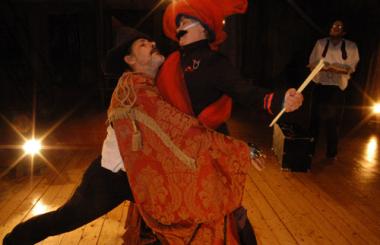There's never much danger of boredom at a Double Edge Theatre performance.
There is, however, an occasional sense of real danger—actors swing through the air, rappel down buildings, and have close encounters with fire. Theirs is theater of physicality and interaction, and a cool 100 percent of the time, it looks spectacular. The latest work to receive the hands-on Double Edge transformation from idea to spectacle is Republic of Dreams: Under the Sign of the Crocodile, based on the life and work of Polish Jewish writer and artist Bruno Schulz. In Republic of Dreams, Schulz, played by Matthew Glassman, explores the farflung corners of his imagination. His everyday world morphs into dreamlike imaginings that are by turns absurd, beautiful and heartbreaking.
In performing spectacle-based theater, the Double Edge troupe often avoids recourse to words, allowing pure image and dream logic to carry the power of a story. In Republic of Dreams, Glassman sometimes speaks and interacts with characters in a straightforward way, then sets into motion worlds of unfettered image. In one sequence, Double Edge lead actor Carlos Uriona rides atop a wardrobe in a yellow rain coat, fireman's hat and skivvies. In another, an accordion-wielding band bursts forth from that same wardrobe. Such explosions of the absurd abound, but smaller, more sensical moments often serve as respite from the work of taking in all of the wild abandon—Schulz details a painting meticulously, and sits at a sparely lit table with his clearly more strait-laced and rigorous parents. It isn't, despite dialogue and such expository scenes, always easy to understand what sort of linear plotline is being skated around, but that's okay. Double Edge does not present conventional theater, and doesn't build plots and character in conventional fashion.
It is the accruing of details and images over the course of the play that conveys the interior world of Schulz. Double Edge is, in a sense, creating and performing in a fashion that is the dramatic equivalent of jazz improvisation around a melody, employing narrative as a launching point rather than as the sole point to be clearly articulated. That said, just as knowing the melody of a jazz tune deepens the appreciation of a solo pirouetting around its memory, knowing more about Schulz and his experiences and his demise at the hands of a jealous Nazi offers points of reference that make taking the Double Edge voyage inviting and accessible, not just visually appealing.
It may not be readily apparent what takes place on the Double Edge farm out in Ashfield, but their process of creating a work as an ensemble rather than in the traditional fashion of interpreting the words and directions of a sole playwright results in beautifully rendered theater on its own terms. Let go of conventional expectations, and their dream-plays will conjure something that can only be described as experience, not mere theater in its stuffy, behind-the-proscenium sense. Republic of Dreams is a worthy effort on its own, but it is merely one of many steps on the ever-changing journey Double Edge began 25 years ago. Their plays seem like a cycle, but one with, in the best and most adventurous sense, no pre-determined end or route.
On July 10 at the National Yiddish Book Center, you can catch a different version of Republic of Dreams, one adapted to the center's performance space, and discuss Schulz and his era in more detail. The performance is part of an event called Art as Healer and Provocateur. After Double Edge performs, Amherst writer Ilan Stavans moderates a discussion using the work of Schulz "as a point of departure" in talking about artistic creation within oppressive social and political circumstances like those of World War II Poland. The panel will include Rabbie Moshe Waldoks, German scholar Sigrid Bauschinger, Double Edge founder and artistic director Stacy Klein, and Double Edge lead actor and producing director Carlos Uriona.
Art as Healer and Provocateur also includes works of art by the Polish Jewish artist who designed the Republic of Dreams set, Mira Zelechower-Aleksiun. Zelechower-Aleksiun's work interprets Jewish stories, Schulz's writing and art, and her own Holocaust experience.
*
Republic of Dreams and Arts as Healer and Provocateur are part of the Paper Bridge Summer Arts Festival, July 10, $18, 8 p.m., National Yiddish Book Center, 1021 West St., Amherst, (413) 256-4900, doubleedgetheatre.org, yiddishbookcenter.org.



